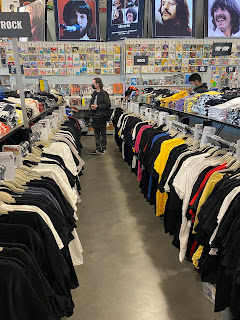Damon Krukowksi's great book (and podcast) Ways of Hearing explores how digital media have transformed the way we hear.
In the chapter on "power," he considers the difference between Spotify's "Discovery Weekly" and visiting a record store. Spotify's algorithm considers what you listen to, adapting to your tastes and likes. He notes, "At Spotify, the dream is to provide you with music without your participation-the algorithm will know what you want" (111).
But when we visit a record store, one has to navigate its space. As Krukowski states, "You adapt to it" (11). If you ever been to Amoeba in Los Angeles--clearly the case!
(Me at Amoeba Music)
By
adapting to the store's layout, you might come across a surprise, maybe
a record you hadn't thought about purchasing. This process involves your
unconscious desire. As I explained in an earlier posting, the logic of desire operates on absence. The object cause of desire (what Jacques Lacan terms objet a) can never be satisfied.
At the same time, the object cause of desire sustains the psychical force of desire because it is unattainable. It is sometimes described as the real of one's desire. Real - meaning the impossible, or in this case, the stumbling block of desire.
In a previous post on the gaze, I noted how cinematic forms can elicit our desire. Like the narrative and formal construction of a movie, the design and layout of a record store considers your desire. A record store is already designed for you to engage with it.
Not all stores will elicit your desire. But in my recent journey to Amoeba, the store reads my desire in how it displays its merchandise. It is not adapting to me (as Spotify does with Discovery Weekly), but is trying to elicit my unconscious desire in anticipating a surprise purchase.
But this raises a question: can algorithms such as Discover Weekly read your desire? In a podcast on the Lacanian Real with Todd McGowan, he argues they can't because they repeatedly tell you what you want.
I think McGowan's claim lines up with Slavoj Zizek's critique of technological singularity. For Zizek, singularity can't account for the unconscious. Likewise, algorithms don't know how to read our unconscious desire.
Instead of a "surprise," (something unexpected which emerges from your encounter at a record store), you discover something new with Discover Weekly, which is based on your tastes. As Krukowski writes, "You find the answers you want to the questions you already know to ask. . . . This makes an ideal experience if all you want is what you want. But what if you're looking for something else?" (112). That "something else" is what Lacan call objet a which algorithms can not provide.
Another way to think about algorithms is they operate on mastery. By contrast, a record store operates on both absence ("something else") and mastery ("all"). As you navigate the story, you try to master it. At the same time, what draws you into the store is absence (unconscious desire).















